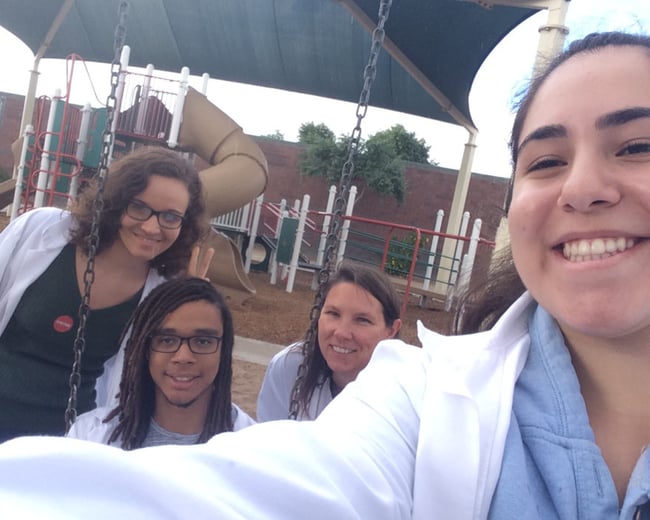Mrs. Rodgers teaches the four PLTW Biomedical Sciences courses, serves as the athletic trainer, and acts as advisor for HOSA-Future Health Professionals and Sports Medicine Clubs at Mountain Ridge High School in Glendale, Arizona. Mrs. Rodgers is a recipient of the 2014 Deer Valley Education Foundation Teacher of the Year Award. She shares her passion for health careers with students on a daily basis in the classroom and the athletic training room. Her hobbies include spending time with her family, vacationing on white sandy beaches, and running.
The Biomedical Innovation curriculum provides students the opportunity to design innovative ideas to solve the health challenges of the 21st century. Students have experience identifying questions and following procedural steps to find a solution to the question.
Mountain Ridge High School’s PLTW Biomedical Innovation students took their four years of critical thinking, experimental investigation, and problem-solving skills outside the classroom last fall. The fourth-year students, who are also HOSA-Future Health Professionals members, served as citizen scientists to collect photographic evidence for the Accessing Drinking Water in Schools Research Project from The University of California Nutrition Policy Institute. Mountain Ridge, one of 13 schools nationwide and the only school in Arizona, was selected by America's ToothFairy: National Children's Oral Health Foundation to participate in this study.
Students received webinar training from the principal researchers on how to properly document and collect photographic evidence of drinking water sources at four schools in our area. Researchers hope to use the evidence to shape policy to improve free drinking water access for school-age children.
The research project allowed students to apply the procedural skills, documentation protocol, and collaborative work with peers beyond their normal classroom activities. Through previous PLTW Biomedical Science courses, students have investigated topics such as proper nutrition, the role of water in maintaining homeostasis, and the importance of lifestyle choices on health and disease prevention. Evaluating the topic of safe drinking water has application to content in all four PLTW Biomedical Science courses.
Training and evidence collection occurred during the Exploring Human Physiology unit. Students had investigated and critiqued various research topic designs, as well as the difference between research presented in popular media and scientific literature. Armed with this information, students evaluated and discussed the importance of conducting The University of California Nutrition Policy Institute protocol to provide valid evidence to the researchers. Upon completion of the evidence collection, students created a scientific poster to showcase their investigation activity.
Afterward, students reflected on their experience, and I’ve included two of their responses below:
- “In this mission, we helped researchers gain an understanding of what free water sources are like at schools and helped them improve the water sources at schools. As citizen scientists, we collected photo evidence of free water sources at four different schools. Our participation will help researchers study the access in free water at schools across the country, educate policy makers, and determine alternate solutions to free drinking water.”
- “One of the careers involved in this mission was a researcher. Research scientists plan and carry out experiments and investigations in a range of areas, from medical research to industrial science. Another career related to our activity was a nutritionist. Nutritionists help to advance an understanding of how diet affects the health and well-being of people and animals. Nutritionists generally work in a preventive role on a one-to-one and a group basis with patients of all ages.”
We will incorporate the experience of our participation in the Accessing Drinking Water in Schools Research Project into future missions in BI. As students are introduced to Environmental Health in Mission 4, we will discuss what further research could be performed on school campuses if environmental hazards existed in our neighborhoods. We will also utilize water from the sources photographed during the Testing the Waters project. Mission 5, Combating a Public Health Issue, will bring the research into focus, as topics such as childhood obesity and nutrition are public health concerns. Implementation of newer water sources could be a topic for students to investigate. In addition, one student’s Independent Project focuses on oral health, and she plans to utilize information from the study as well as contact researchers and partners to gain insight for project.
PLTW’s blog is intended to serve as a forum for ideas and perspectives from across our network. The opinions expressed are those of each guest author.


